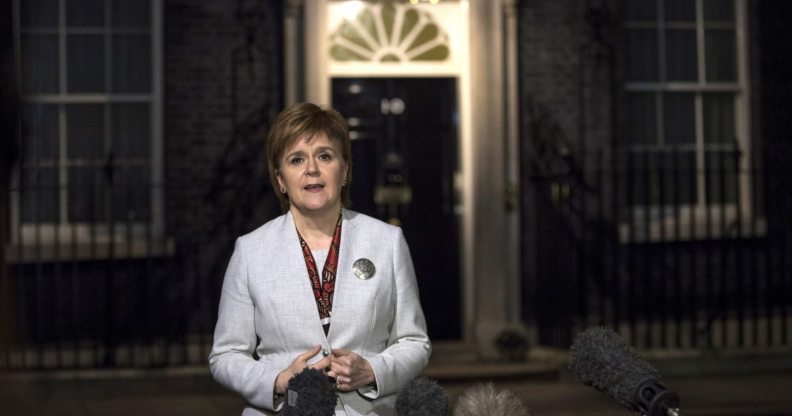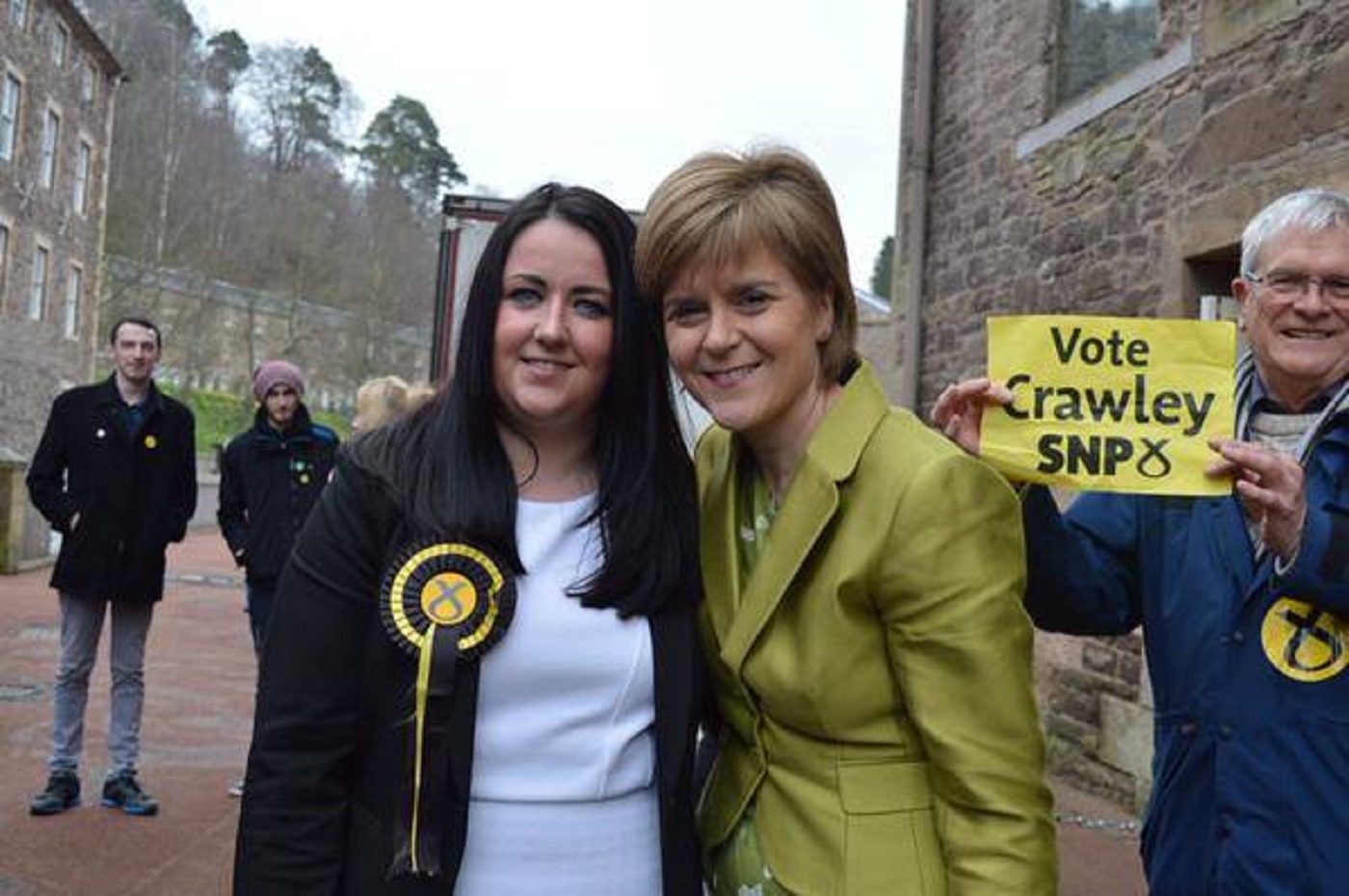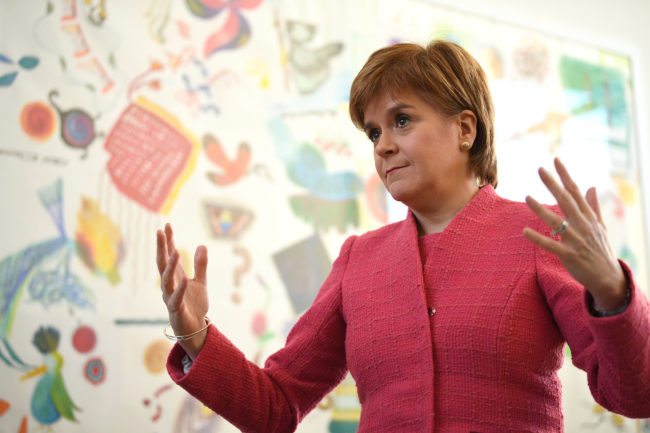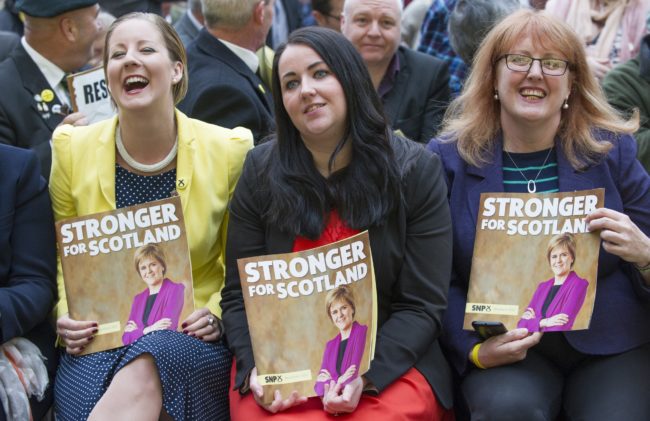Scottish government vows to push on with transgender reforms amid Westminster delays

LONDON, ENGLAND – NOVEMBER 14: First Minister and Scottish National Party Leader Nicola Sturgeon leaves 10 Downing Street to speak to the press on November 14, 2017 in London, England. The SNP leader travelled to Downing Street for her first face-to-face talks with Britain’s Prime Minister Theresa May since March. (Photo by Dan Kitwood/Getty Images)
The Scottish government has vowed to push on with reforms to gender recognition laws, after progress was stalled in Westminster.
Last year the UK’s Secretary of State for Education and Minister for Women and Equalities Justine Greening had announced plans to review the Gender Recognition Act, a 2004 law that allows transgender people to gain legal recognition.
LGBT advocates had called for the law to be streamlined to reduce the hurdles that transgender people have to jump through to get a Gender Recognition Certificate, adopting a simpler ‘self-declaration’ system that operates in Ireland and other countries across Europe.
The review was reportedly delayed last week after an anti-transgender media campaign, with The Times reporting that the issue’s “complex and divisive” nature had led to plans being stalled.
But the Scottish government has vowed to push ahead with changes itself.
A separate consultation on reforms to the GRA has already launched in Scotland.
The Scottish consultation considers proposals to make it simpler and less intrusive for transgender people to access legal gender recognition, and considers options to give non-binary people legal recognition for the first time in the UK.
The consultation, which launched in November, will close on March 1.
SNP Equalities spokesperson Angela Crawley MP told PinkNews: “2018 will be an important year for LGBTI equality in Scotland as the Scottish Government takes action on landmark transgender equality reforms”, confirming that “the SNP government will be working to improve transgender equality in Scotland”.

Angela Crawley MP with Nicola Sturgeon
She told PinkNews: “The Scottish Government’s landmark proposals to improve gender recognition laws will help make Scotland a world-leader on transgender equality, by making it simpler and less intrusive for trans people to access their human right to legal gender recognition, and by enabling non-binary people to access recognition for the first time in the UK.
“Scotland is the first part of the UK to begin reforming the law – with a consultation on the proposals currently underway.
“I hope that trans and non-binary people will take this important opportunity to respond with their views and experiences before the consultation closes in March.”
Current gender recognition laws apply UK-wide.
But Ms Crawley said the SNP would “continue to push the UK government to fully devolve equality law”.

First Minister Nicola Sturgeon (Photo by Jeff J Mitchell/Getty Images)
The Scottish Parliament is also set to green-light a law this year extending pardons to people with historical gay sex offences, bringing the country in line with reforms already made last year in England, Wales and Northern Ireland.
Ms Crawley told PinkNews: “While we look to the future it is also important that we seek to right the wrongs of the past. Following Nicola Sturgeon’s powerful statement of apology in November, the Historical Sexual Offences (Pardons and Disregards) (Scotland) Bill will continue to make its way through the Scottish Parliament before MSPs vote on a final version of the bill in the coming months.
“This milestone legislation will provide an automatic pardon and apology for all gay and bisexual men convicted under homophobic laws that are no longer on the statute book, while enabling people to have these discriminatory convictions removed from their central records so they no longer impact on people’s lives.”
The legislation in England, Wales and Northern Ireland requires people with historical offences to apply for a pardon and have their case manually reviewed, due to concerns about the implications for the criminal records system.
SNP politicians had strongly criticised this and vowed to pass a system in Scotland that would not require people to apply.

Angela Crawley MP,
centre (Photo by LESLEY MARTIN/AFP/Getty Images)
However, the Scottish government later conceded that while symbolic “pardons” will be automatically granted, men will still need to apply to actually have convictions removed from central criminal conviction records.
The UK Parliament’s Women and Equalities Committee published a report in 2016 that called for improvements to the Gender Recognition Act, reducing the number of medical and bureaucratic requirements for transgender people to change legal gender.
The Gender Recognition Act does not regulate who is permitted to use gender-segregated spaces, but much of the coverage of the issue has inaccurately claim that reforms would give more people permission to enter female toilets.
Anti-transgender campaigners have called for the UK government’s review to be scrapped.
Tory MP David Davies, a strong opponent of transgender equality, called on Justine Greening to axe the plan to avoid giving rights to people who are “effectively cross-dressers”.
He said: “Given the delay to this and the fact that many LGBT campaigners are opposed to this, I would urge the government to think again.
“Although there is obvious need to protect someone who is transgender from bullying and victimisation… it’s also important that we don’t allow women’s rights to be trampled on to allow those who are effectively cross-dressers to enter places, such as changing rooms, hospital wards and prisons, where women would expect privacy.”
There have been zero reported issues since Ireland adopted a self-declaration system in 2015.
The decision to shelve the review comes after a transgender ‘moral panic’ in the media which has seen relentless weekly stories targeting transgender people.
The stream of stories have led of a flood of complaints to press regulators IPSO and Impress, but no newspaper has thus far been sanctioned for its coverage.
The Times published a string of articles targeting a 19-year-old transgender girl, after she was named a women’s officer by her constituency Labour Party.
The newspaper targeted Madigan for taking on the local women’s officer role and for applying for the party’s Jo Cox Women in Leadership Scheme.
Angela Crawley MP said: “2018 will be a important year for LGBTI equality in Scotland – as we right historical wrongs with the passage of Scotland’s ‘Turing Law’ and move forward with progress on transgender equality.
“The Scottish Government’s landmark proposals to improve gender recognition laws will help make Scotland a world-leader on transgender equality, by making it simpler and less intrusive for trans people to access their human right to legal gender recognition, and by enabling non-binary people to access recognition for the first time in the UK.
“Scotland is the first part of the UK to begin reforming the law – with a consultation on the proposals currently underway. I hope that trans and non-binary people will take this important opportunity to respond with their views and experiences before the consultation closes in March.
“While we look to the future it is also important that we seek to right the wrongs of the past. Following Nicola Sturgeon’s powerful statement of apology in November, the Historical Sexual Offences (Pardons and Disregards) (Scotland) Bill will continue to make its way through the Scottish Parliament before MSPs vote on a final version of the bill in the coming months.
“This milestone legislation will provide an automatic pardon and apology for all gay and bisexual men convicted under homophobic laws that are no longer on the statute book, while enabling people to have these discriminatory convictions removed from their central records so they no longer impact on people’s lives.
“In government, the SNP will continue to drive forward LGBTI equality in other important areas too – from tackling bullying in schools and supporting LGBTI-inclusive education, to taking action on hate crime, and delivering record funding to LGBTI equality projects.
“At Westminster, SNP MPs will continue to push the UK government to fully devolve equality law and to take action in reserved areas including reform of the asylum system.
“Scotland has made huge progress on LGBTI equality in recent years but we know there is still more to do. That’s why the SNP is committed to showing leadership, and taking the action needed, to make Scotland a fair and equal country for everyone.”

